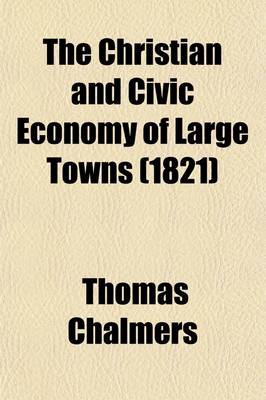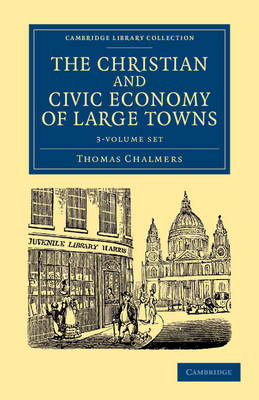Cambridge Library Collection - British and Irish History, 19th Century
4 total works
The Christian and Civic Economy of Large Towns (Volume 1)
by Thomas Chalmers
Published 15 January 2012
This three-volume study by the Scottish churchman and social reformer Thomas Chalmers (1780-1847) is a revealing work of Christian morality as applied to urban economic theory. Having moved to Glasgow in 1815, Chalmers was given a free hand in 1819 for an experiment in urban ministry at the new parish of St John's in the poorest district of the city. His reforms improved education and reduced the need for institutional poor relief by dividing the area into manageable 'proportions' that were closely looked after by parish elders and deacons, reviving a traditional community spirit and promoting self-help. Although sometimes severe, Chalmers' system and this influential work reflect Enlightenment optimism regarding human nature, suggesting the need for the Church of Scotland to respond actively to problems of urban industrialisation. Volume 1, published in 1821, outlines his theories of locality and the ways in which the Church could support the community.
The Christian and Civic Economy of Large Towns: Volume 2
by Thomas Chalmers
Published 1 January 2010
This three-volume study by the Scottish churchman and social reformer Thomas Chalmers (1780-1847) is a revealing work of Christian morality as applied to urban economic theory. Having moved to Glasgow in 1815, Chalmers was given a free hand in 1819 for an experiment in urban ministry at the new parish of St John's in the poorest district of the city. His reforms improved education and reduced the need for institutional poor relief by dividing the area into manageable 'proportions' that were closely looked after by parish elders and deacons, reviving a traditional community spirit and promoting self-help. Although sometimes severe, Chalmers' system and this influential work reflect Enlightenment optimism regarding human nature, suggesting the need for the Church of Scotland to respond actively to problems of urban industrialisation. Volume 2, published in 1823, investigates the nature of pauperism in Scotland and England and the ways in which Parliament and the parish can work towards its abolition.
This three-volume study by the Scottish churchman and social reformer Thomas Chalmers (1780-1847) is a revealing work of Christian morality as applied to urban economic theory. Having moved to Glasgow in 1815, Chalmers was given a free hand in 1819 for an experiment in urban ministry at the new parish of St John's in the poorest district of the city. His reforms improved education and reduced the need for institutional poor relief by dividing the area into manageable 'proportions' that were closely looked after by parish elders and deacons, reviving a traditional community spirit and promoting self-help. Volume 3, published in 1826, was written after Chalmers left St John's to become Chair of Moral Philosophy at St Andrew's. It focuses on the relationship between labour, wages and poor relief, discussing how labouring classes should not depend upon welfare and wages to relieve want, but rather practise self-help to reform their condition from below.
The Christian and Civic Economy of Large Towns 3 Volume Set
by Thomas Chalmers
Published 27 June 2013
This three-volume study by the Scottish churchman and social reformer Thomas Chalmers (1780-1847) is a revealing work of Christian morality as applied to urban economic theory. Having moved to Glasgow in 1815, Chalmers was given a free hand in 1819 for an experiment in urban ministry at the new parish of St John's in the poorest district of the city. His reforms improved education and reduced the need for institutional poor relief by dividing the area into manageable 'proportions' that were closely looked after by parish elders and deacons, reviving a traditional community spirit and promoting self-help. Although sometimes severe, Chalmers' system and this influential work, first published between 1821 and 1826, reflect Enlightenment optimism regarding human nature, suggesting the need for the Church of Scotland to respond actively to problems of urban industrialisation.


